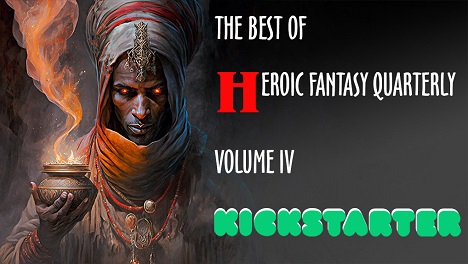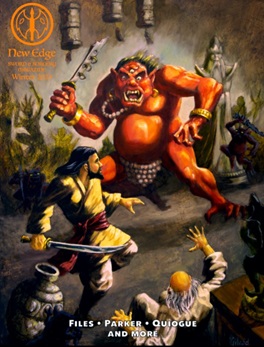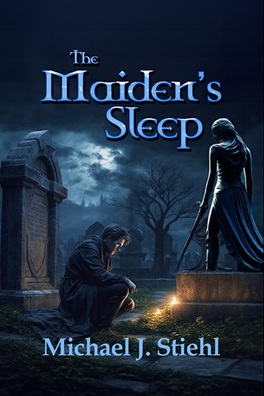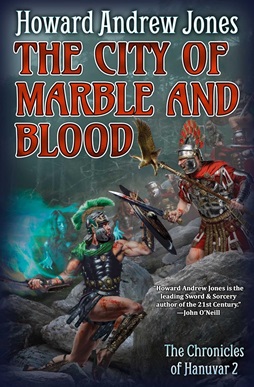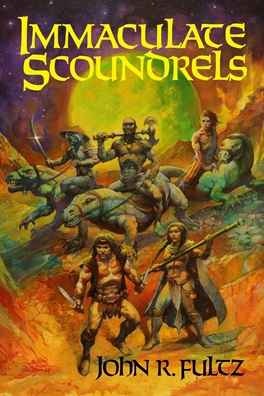WHAT CLEV YUN WOULD WANT TO TELL
WHAT CLEV YUN WOULD WANT TO TELL, by Adrian Simmons
In the hostage house of Soviran– the man who called himself king of the Tamoncol tribe– lived a foreigner. A one-time ally from a land so far away that most of the Tamoncol believe it to be merely legend. The one-time ally is now a prisoner, and has been for many years. His name is Clev-Yun, and through the time of his captivity he has often wondered what he would say to his people should he ever return home.
Clev-Yun has learned many of his captors’ stories and legends and he thinks–more often than he would like to admit– of one day finding himself in the plaza of his home, with his people crowding around him in a great welcoming crush. And when they folk ask him how such a rabble has been able to defeat two separate invasions, this is the story he would want them hear:
When the Dwanul still had a single king, and their years in this land could be counted on a single hand, they had a king named Anlanol the Wise.
And here, at the very start, Clev-Yun would stop. He would point out that the Dwanul have no true leader, they have no God-King. They are a people where every famer who is slightly more successful than his neighbors thinks he is a better man and claims himself chief and every petty chief who has had success in war and raiding calls himself a king. It is a society made like a cloak of mouse hides; more stitching than anything else.
And he will continue the tale: Anlanol was greatly vexed by the problem of the coming winter– for winter was new to the Dwanul. He pondered and wondered about the best way to deal with the coming cold, and because he was wise, he had found a solution to the suffering of his people.
He called his wife Sanvalaw to him : “The winter will come again, and soon. Already the leaves change color. The Badger-folk say that this winter will be a bad one and they have a gift for prophecy. We have hunted deer and horse and cattle, but we do not have enough hides for everyone to have a cloak.”
“It is a pity,” Sanvalaw answered him. For such is the way a woman who has a cloak would.
“But the Badger-folk have shown me a trick;” Anlanol said, “that the hairs of a single hide cloak can be woven into two, and that the skin itself is still left for one more.”
Anlanol was wise, and Sanvalaw was greatly loved by the people. She said, “Even so, we do not have enough hides for everyone to have a cloak.”
“There are other secrets that the Badger-folk have shown me,” Anlanol said. “For grass and the reeds can be woven into cloaks as well. They will not last as long one of made of hair or hide, but they will last through the winter.”
To this Sanvalaw said nothing at all.
“What our people must do,” the king said, “is scrape the hides we have, and we must gather the grasses and the reeds and we must make cloaks.”
“The people have so much to do,” Sanvalaw said, “hunting, harvesting, watching if the mound-folk try to raid. They can do little else.”
But Anlanol was wise. “The people love you, and if you weave hair or reeds into cloth, they will do so as well.”
Sanvalaw said: “None of us remember the days or the lands before our escape upon the seven ships.”
Again Clev-Yun would stop and point out that the tribes of the Dwanul do not believe they were made by any god or gods. Their history begins with them escaping from lands and lives they do not remember. They do not even agree on the number of ships that brought their ancestors to this land. Seven ships, seventeen, seventy; some even say seventy-seven and– this is a point that Clev-Yun will emphasize– for all the things they fight about, the number of ships that brought them is not one of them. They do not understand the purity of doctrine; even if they did there is no single king who would enforce it.
And he would continue with what Sanvalaw, who was loved by the people, was saying: “But what I do remember is that I was bound to a great loom and wove and wove like a spider in a web. I will not weave.”
But Anlanol was wise. “I remember a pit, wider than five spear-throws, and deeper than six, and endless days of digging salt from the earth. Yet I have hauled water from the sea to dry in the sun to get salt to preserve meat for the winter. I myself will go with you to the great lawn and we will weave, and the people will see and learn of its importance.”
Sanvalaw said, “There are hides and cloaks among the Badger-folk. You should take them, or bring the Badger-folk here to do the weaving.”
At this Anlanol’s wisdom gave way to anger, “The Badger-folk are our friends, they were our allies against the mound-builders, they taught us that winter would always come, and when to plant and harvest. I will dig another salt pit before I raid them for slaves. What I will do is meet you in the lawn in the morning and we will scrape the hair off my best bear-skin cloak and with a distaff and quern we will turn that hair into thread and weave that thread into two cloaks.”
Sanvalaw said, “I will not weave.”
There is a limit to wisdom and a limit to patience and Anlanol struck Sanvalaw across the face so hard that she swooned. “You will meet me in the yard tomorrow and we will serve as an example for the people.”
And Sanvalaw said nothing.
The next day came, and the cold of the coming winter came with it, and Anlanol walked to the lawn wearing his best bear-cloak (for he was wise) and carrying his ox-hide cloak. Sanvalaw came out of her chambers and held up her right hand before her bruised face and two of the fingers were swollen and splinted together. And she said: “I fell the other day and broke two fingers, and without two full hands I cannot weave.”
Anlanol was wise, but he was no fool, and wisdom fled and he struck Sanvalaw a blow so fierce that she had to be carried back to her chambers.
But Anlanol had no time for anger, and he called out his people and he stood in the yard and scraped the hair from the hide, and spun the hair into thread, and wove the thread into a cloak. And he sent the word out that that this was to be done by everyone, and that tomorrow he would have the people come back and he would show them how to weave reeds into a cloak that was almost as good as bear-hide.
He went to visit his wife and tell her that she was right about the drudgery of the loom. He found her servants wailing and keening outside of her chamber, for she had never woken from the blow and had died during the day. What the bitter cold winters could not do, what the flight from bondage across a hateful sea could not do, what the raiding of the mound-folk could not do, he had done.
Anlanol had no time for grief, and gathering his favored warriors and servants labored long into the night to build a stone chamber for her and in the darkness he took her within and turned her face toward the sunrise.
Here Clev-Yun will pause again. That is how the story progresses, when it is told the first time, which tends to be in the summer. But in the long dark nights of winter what they say is this:
Anlanl had no time for grief, and gathering his favored warriors and servants, he labored long into the night to build a stone chamber for her and in the darkness he took her within and turned her face toward the sunrise. Weariness and grief forced out wisdom and he believed because he had to believe that these actions would make a difference to the people.
Clev-Yun will tell his audience that the rest of the story never changes, and this is the kind of people who make up the tribes that make up the Dwanul:
And the next day the people came, and each one of them, men and women, held up a hand with a broken finger, for Queen Sanvalaw was greatly loved by the people. And they could not weave.
The winter that came was cold and long and many died; mostly the very young and the very old.
__________________________________
If you’re at Heroic Fantasy Quarterly, then you probably already know Adrian Simmons. His bronze-age fantasy has appeared at Heroic Fantasy Quarterly (Bronze-Ard and the Ferret-Master), Lackington’s (How I Came to be Raised by Balniwan the Fool, and The Waking of Giants). Wondering just what Frodo knew and when he knew it? Gotcha covered. Desertification-eco-sword-and-sorcery? He’ll be your huckleberry. Want to delve into literary science fiction? Oh yeah, he made that happen.
